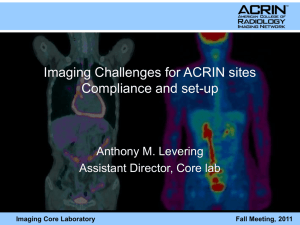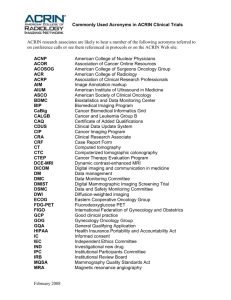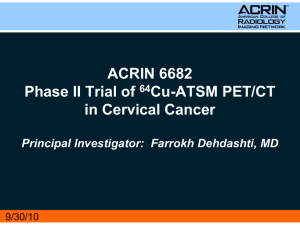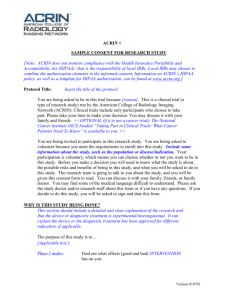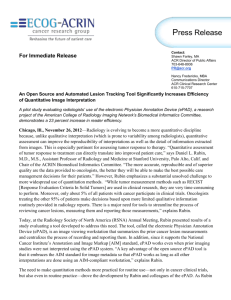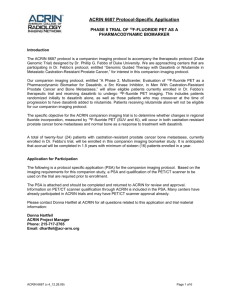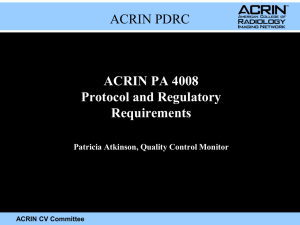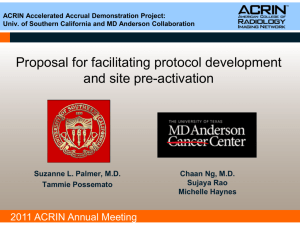Read the full release
advertisement
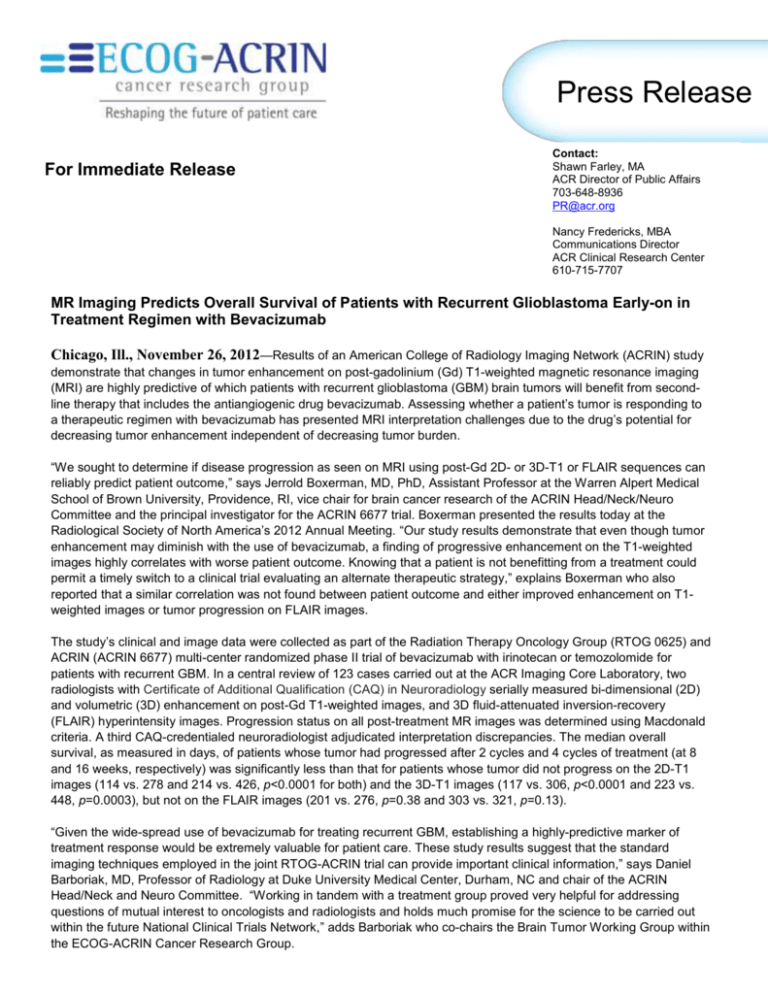
Press Release For Immediate Release Contact: Shawn Farley, MA ACR Director of Public Affairs 703-648-8936 PR@acr.org Nancy Fredericks, MBA Communications Director ACR Clinical Research Center 610-715-7707 MR Imaging Predicts Overall Survival of Patients with Recurrent Glioblastoma Early-on in Treatment Regimen with Bevacizumab Chicago, Ill., November 26, 2012—Results of an American College of Radiology Imaging Network (ACRIN) study demonstrate that changes in tumor enhancement on post-gadolinium (Gd) T1-weighted magnetic resonance imaging (MRI) are highly predictive of which patients with recurrent glioblastoma (GBM) brain tumors will benefit from secondline therapy that includes the antiangiogenic drug bevacizumab. Assessing whether a patient’s tumor is responding to a therapeutic regimen with bevacizumab has presented MRI interpretation challenges due to the drug’s potential for decreasing tumor enhancement independent of decreasing tumor burden. “We sought to determine if disease progression as seen on MRI using post-Gd 2D- or 3D-T1 or FLAIR sequences can reliably predict patient outcome,” says Jerrold Boxerman, MD, PhD, Assistant Professor at the Warren Alpert Medical School of Brown University, Providence, RI, vice chair for brain cancer research of the ACRIN Head/Neck/Neuro Committee and the principal investigator for the ACRIN 6677 trial. Boxerman presented the results today at the Radiological Society of North America’s 2012 Annual Meeting. “Our study results demonstrate that even though tumor enhancement may diminish with the use of bevacizumab, a finding of progressive enhancement on the T1-weighted images highly correlates with worse patient outcome. Knowing that a patient is not benefitting from a treatment could permit a timely switch to a clinical trial evaluating an alternate therapeutic strategy,” explains Boxerman who also reported that a similar correlation was not found between patient outcome and either improved enhancement on T1weighted images or tumor progression on FLAIR images. The study’s clinical and image data were collected as part of the Radiation Therapy Oncology Group (RTOG 0625) and ACRIN (ACRIN 6677) multi-center randomized phase II trial of bevacizumab with irinotecan or temozolomide for patients with recurrent GBM. In a central review of 123 cases carried out at the ACR Imaging Core Laboratory, two radiologists with Certificate of Additional Qualification (CAQ) in Neuroradiology serially measured bi-dimensional (2D) and volumetric (3D) enhancement on post-Gd T1-weighted images, and 3D fluid-attenuated inversion-recovery (FLAIR) hyperintensity images. Progression status on all post-treatment MR images was determined using Macdonald criteria. A third CAQ-credentialed neuroradiologist adjudicated interpretation discrepancies. The median overall survival, as measured in days, of patients whose tumor had progressed after 2 cycles and 4 cycles of treatment (at 8 and 16 weeks, respectively) was significantly less than that for patients whose tumor did not progress on the 2D-T1 images (114 vs. 278 and 214 vs. 426, p<0.0001 for both) and the 3D-T1 images (117 vs. 306, p<0.0001 and 223 vs. 448, p=0.0003), but not on the FLAIR images (201 vs. 276, p=0.38 and 303 vs. 321, p=0.13). “Given the wide-spread use of bevacizumab for treating recurrent GBM, establishing a highly-predictive marker of treatment response would be extremely valuable for patient care. These study results suggest that the standard imaging techniques employed in the joint RTOG-ACRIN trial can provide important clinical information,” says Daniel Barboriak, MD, Professor of Radiology at Duke University Medical Center, Durham, NC and chair of the ACRIN Head/Neck and Neuro Committee. “Working in tandem with a treatment group proved very helpful for addressing questions of mutual interest to oncologists and radiologists and holds much promise for the science to be carried out within the future National Clinical Trials Network,” adds Barboriak who co-chairs the Brain Tumor Working Group within the ECOG-ACRIN Cancer Research Group. ### About ACRIN ACRIN is a clinical trials cooperative group made up of affiliated investigators at over 100 academic and communitybased facilities in the United States and internationally. ACRIN’s research encompasses the full range of medical imaging investigation, from landmark cancer screening trials to early-phase trials evaluating imaging biomarkers and novel imaging technologies. ACRIN is administered by the American College of Radiology and is headquartered at the ACR Clinical Research Center in Philadelphia, PA. The ACRIN Biostatistics Center is located at Brown University in Providence, RI. www.acrin.org In May 2012, ACRIN merged its oncology research program with the Eastern Cooperative Oncology Group (ECOG), a membership-based research organization whose large-scale cancer treatment clinical trials for major diseases have changed the standard of care for cancer patients and helped to individualize their therapy. The ECOG-ACRIN Cancer Research Group designs and conducts clinical research along the cancer care continuum, with an integrated focus on therapeutic, diagnostic, preventative, and biomarker-driven trials. www.ecog-acrin.org
